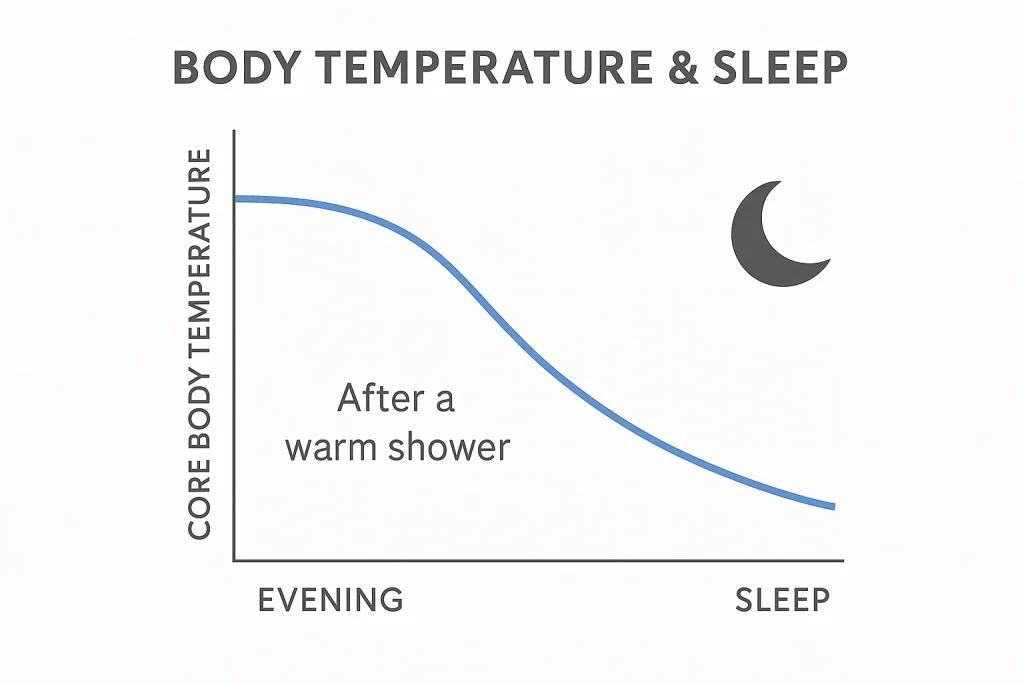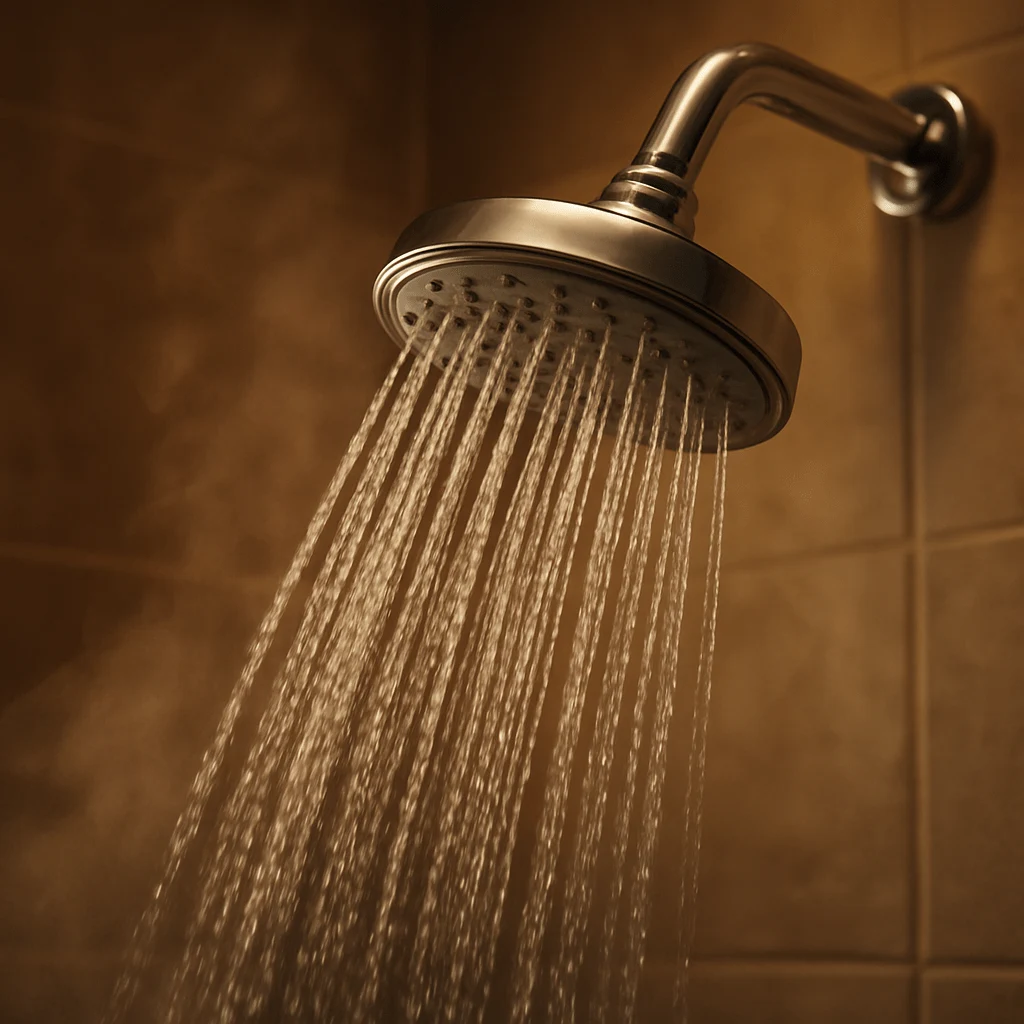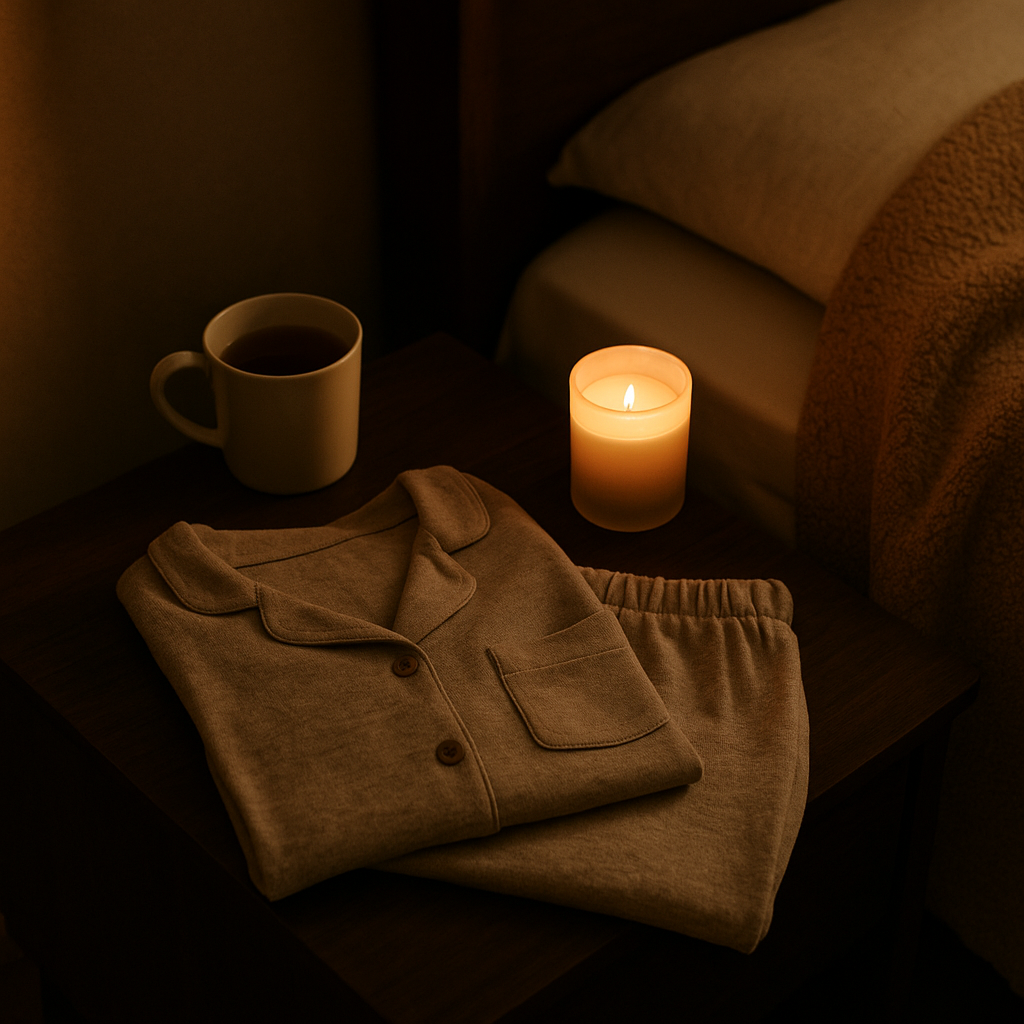You’ve made it through the day, and now all you want is to unwind. But sometimes, getting your body and mind to actually slow down at night is harder than it should be.
Maybe you’ve heard that a shower before bed can help you sleep better—but is it really true? And if so, what kind of shower? Warm or cold? How long before sleep?
These small choices can quietly shape how rested you feel in the morning—and your nighttime shower might be more important than you think.
In this post, we’ll explore how showering affects your sleep, the best timing and temperature, and how to create a calming bedtime shower routine. If you’re curious whether switching up your shower habit could help you fall asleep faster or sleep more deeply—you’re in the right place.
Is It a Good Idea to Shower Before Bed?

For many people, a nighttime shower is more than just a way to rinse off the day—it’s a moment to pause, breathe, and mentally shift into rest mode.
One reason this helps? A warm shower can actually support your body’s natural sleep rhythm. As you step out of the warm water and start drying off, your core body temperature begins to drop slightly. That gentle cooling mimics what naturally happens in the evening as your body prepares for sleep.
That small shift sends a message to your brain: it’s time to slow down.
But it’s not just about temperature. The routine itself matters.
When you shower at the same time each night, your brain starts to associate that habit with winding down. Over time, it becomes a cue that the day is done. And that can be surprisingly powerful—especially if your evenings tend to feel scattered or rushed.
Of course, what works beautifully for one person might not feel the same for someone else. And that’s completely normal. If a shower at night helps you feel grounded and relaxed, it’s a lovely thing to keep in your routine. And if it doesn’t? You’re not doing anything wrong. There are many gentle ways to prepare for rest—this is just one of them.
How Showers Affect Sleep: The Science Behind It

our body runs on a 24-hour cycle called the circadian rhythm, and one of the signals it uses to prepare for sleep is your core body temperature. As night approaches, your temperature starts to drop—a quiet cue that helps trigger sleepiness.
Taking a warm shower in the evening can enhance this natural process.
Here’s how it works: Warm water heats up the skin and opens up blood vessels near the surface. Once you step out, your body starts to cool down—sometimes even faster than it would on its own. That drop in temperature reinforces your body’s message that it’s time to wind down.
A 2019 meta-analysis published in Sleep Medicine Reviews found that a warm bath or shower taken about 60 to 90 minutes before bed helped participants fall asleep faster and improve overall sleep quality. That small adjustment can make a big difference—especially if you struggle with a busy mind at night.
Do Showers Make You Sleepy or Awake?
It depends a little on the type of shower you take—and when.
- A warm shower tends to be soothing, especially when timed right. It supports the natural drop in core temperature and helps the nervous system shift into rest mode.
- A cold shower, on the other hand, can be invigorating. For some people, that makes it better suited for mornings—but others find it helps them reset and relax at night. More on that in a moment.
So, if you’ve ever noticed that a warm shower makes you yawn before you even hit the pillow, there’s a good reason. It’s not just the water—it’s your body responding to a shift it already knows how to make.
Related Post: 15 Proven Hacks to Fall Asleep Faster
Benefits of a Warm Shower Before Bed

There’s something intuitively calming about stepping into a warm shower after a long day. It doesn’t just clean your body—it softens the whole mood.
Here’s how a warm shower can support better sleep:
1. It Helps Your Body Unwind
Warm water relaxes tight muscles, eases tension, and slows your breathing. Whether you’ve been stuck at a desk or on your feet all day, that physical release can help the rest of your system follow suit.
2. It Becomes a Signal for Rest
Over time, repeating the same nighttime habits teaches your brain what to expect. A shower at night becomes a cue: we’re shifting into rest now.
This kind of wind-down ritual is especially helpful if your evenings feel busy, noisy, or mentally cluttered.
3. It Gives You a Moment of Stillness
Showers are one of the few times we’re not on our phones, answering emails, or juggling other people’s needs. That quiet space—just you, the water, and your breath—can feel like a reset button.
4. It Supports Your Natural Temperature Drop
As you step out of the warm water, your body starts cooling down. That mirrors your internal sleep pattern, helping you drift off more easily.
If this part of your routine feels grounding and gentle, keep it. And if some nights it doesn’t quite work? That’s okay. The goal isn’t perfection—it’s awareness.
Benefits of a Cold Shower Before Bed

Cold showers aren’t typically associated with sleep—but for some people, they can be surprisingly helpful at night.
Here’s how:
It Might Calm a Stressed Nervous System
Cold water can activate the vagus nerve, which plays a role in calming heart rate and lowering anxiety. Some people find that a brief cool shower helps them shift from feeling wired to feeling more centered.
It Can Interrupt Mental Overload
If your mind is spinning from screen time or stress, a cold rinse may act as a quick sensory reset—helping to pull you out of racing thoughts.
It May Help You Cool Down
If you tend to feel too warm at night or live in a hot climate, a cool shower can help regulate body temperature so you’re more comfortable in bed.
Of course, cold showers don’t work for everyone. Some people feel energized afterward—which isn’t ideal before bed. If that’s you, no need to push it. A short lukewarm rinse might be a better compromise.
This is where trial and error comes in. Try a warm shower one night, a cool rinse the next, and simply notice how your body responds. If it helps you feel calmer, keep it in your routine. If not, there’s no pressure to stick with it. The goal isn’t to follow a rule—it’s to find what helps you feel more at ease before bed.
Which Is Better for Sleep — a Warm or Cold Shower?
If you’re wondering whether one type of shower is officially better for sleep, the short answer is: it depends on your body, your preferences, and your evening needs.
Why Warm Showers Are Best for Most Sleep Routines
Warm showers tend to be the most commonly recommended for better sleep—and for good reason.
They:
- Help relax muscles and reduce tension
- Support the body’s natural temperature drop
- Create a calming environment that signals bedtime
- Fit easily into a comforting nighttime routine
Most sleep research supports the use of warm or hot showers about 60–90 minutes before bed, especially for people who struggle with winding down at night.
When Cold Showers Before Bed Might Actually Help
Cold or cool showers can feel invigorating—but for some, they provide a reset when anxiety or sensory overload is high.
They might:
- Soothe an overstimulated nervous system
- Help reduce body heat on warm nights
- Create a sense of clarity or grounding for certain people
Still, they aren’t ideal for everyone. Some bodies respond to cold water with alertness rather than calm, which can make falling asleep more difficult.
There’s no universal answer here—and that’s okay.
The best choice is the one that helps you feel settled, safe, and ready for rest. If you’re unsure, try both on different nights and pay attention to how your body responds afterward.
- Are you feeling calmer? Or more alert?
- Does sleep come easier afterward—or not so much?
That kind of quiet observation can be more helpful than any rule or study.
How to Create a Calming Bedtime Shower Routine

Your evening shower doesn’t need to be long or elaborate. A few small shifts can turn it into a simple ritual that helps your body and mind ease into sleep.
Set the Mood First
Dim the lights in your bathroom, put on soft music, or light a candle with a relaxing scent like lavender. This simple transition helps signal bedtime.
Keep the Water Comfortable
Aim for warm—not too hot. If you’re experimenting with cooler water, start warm and lower the temperature slightly toward the end.
Add a Soothing Touch
Use a soft towel, a calming body wash, or a few drops of essential oil on the shower floor. These little details can help shift your nervous system out of go-mode.
Slow Down Just a Bit
Give yourself a few extra moments to be present. Let the water wash away the day while you breathe and reset.
Ease Into the Rest of Your Routine
After your shower, keep the lights low. Cozy pajamas, herbal tea, or quiet stretches can gently lead you into sleep.
Related Posts:
Bottom Line: Finding What Works for You
Showering before bed can be a beautiful part of your sleep routine—but only if it truly helps you feel at ease.
Maybe you love the way warm water melts away the stress of the day. Or maybe you’ve found that a quick cool rinse brings clarity when your mind won’t settle.
Whatever you choose, what matters most is how you feel afterward—calm, grounded, and ready to rest.
Sleep habits are deeply personal. It’s okay to experiment, adjust, and change your rhythm over time. Sometimes, the smallest changes—like how and when you shower—can help create more ease in your nights.
Feel free to try, tweak, and make it your own.
What about you? Have you noticed a difference in how you sleep after a warm or cold shower? Share your thoughts or routines in the comments—we’d love to hear what’s working for you.
Frequently Asked Questions
Is bathing before sleep good or bad?
For most people, bathing before bed is not only good—it can be deeply calming. A warm bath or shower helps ease physical tension, lower stress, and signal to your body that it’s time to slow down. Unless it disrupts your rhythm, it’s a gentle habit worth keeping.
What temperature should a bedtime shower be?
Aim for warm—not too hot. Around 104°F to 108°F (40–42°C) tends to be ideal. This helps your body cool down afterward, which supports the natural sleep process. If the water’s too hot or too cold, it might work against your body’s rhythm.
Can a hot shower help with anxiety before bed?
Yes. A warm shower can calm both the body and mind by relaxing your muscles and slowing your breathing. It may also help trigger your body’s parasympathetic nervous system—your built-in “relax” mode—which makes it easier to fall asleep feeling more at ease.
Do I need to shower every night to sleep well?
Not necessarily. If a shower helps you relax, it’s a wonderful part of a sleep routine—but it’s not essential. Other calming habits, like reading, stretching, or journaling, can be just as effective. The key is finding what helps you unwind.
Does showering before bed help with insomnia?
It can—especially if your insomnia is tied to stress, restlessness, or trouble winding down. A warm shower may help lower your heart rate, quiet racing thoughts, and create a sense of routine. While it won’t cure insomnia on its own, it can be a gentle first step toward better sleep.
{ “@context”: “https://schema.org”, “@type”: “FAQPage”, “mainEntity”: [ { “@type”: “Question”, “name”: “Is bathing before sleep good or bad?”, “acceptedAnswer”: { “@type”: “Answer”, “text”: “For most people, bathing before bed is not only good—it can be deeply calming. A warm bath or shower helps ease physical tension, lower stress, and signal to your body that it’s time to slow down. Unless it disrupts your rhythm, it’s a gentle habit worth keeping.” } }, { “@type”: “Question”, “name”: “What temperature should a bedtime shower be?”, “acceptedAnswer”: { “@type”: “Answer”, “text”: “Aim for warm—not too hot. Around 104°F to 108°F (40–42°C) tends to be ideal. This helps your body cool down afterward, which supports the natural sleep process. If the water’s too hot or too cold, it might work against your body’s rhythm.” } }, { “@type”: “Question”, “name”: “Can a hot shower help with anxiety before bed?”, “acceptedAnswer”: { “@type”: “Answer”, “text”: “Yes. A warm shower can calm both the body and mind by relaxing your muscles and slowing your breathing. It may also help trigger your body’s parasympathetic nervous system—your built-in “relax” mode—which makes it easier to fall asleep feeling more at ease.” } }, { “@type”: “Question”, “name”: “Do I need to shower every night to sleep well?”, “acceptedAnswer”: { “@type”: “Answer”, “text”: “Not necessarily. If a shower helps you relax, it’s a wonderful part of a sleep routine—but it’s not essential. Other calming habits, like reading, stretching, or journaling, can be just as effective. The key is finding what helps you unwind.” } }, { “@type”: “Question”, “name”: “Does showering before bed help with insomnia?”, “acceptedAnswer”: { “@type”: “Answer”, “text”: “It can—especially if your insomnia is tied to stress, restlessness, or trouble winding down. A warm shower may help lower your heart rate, quiet racing thoughts, and create a sense of routine. While it won’t cure insomnia on its own, it can be a gentle first step toward better sleep.” } } ] }

